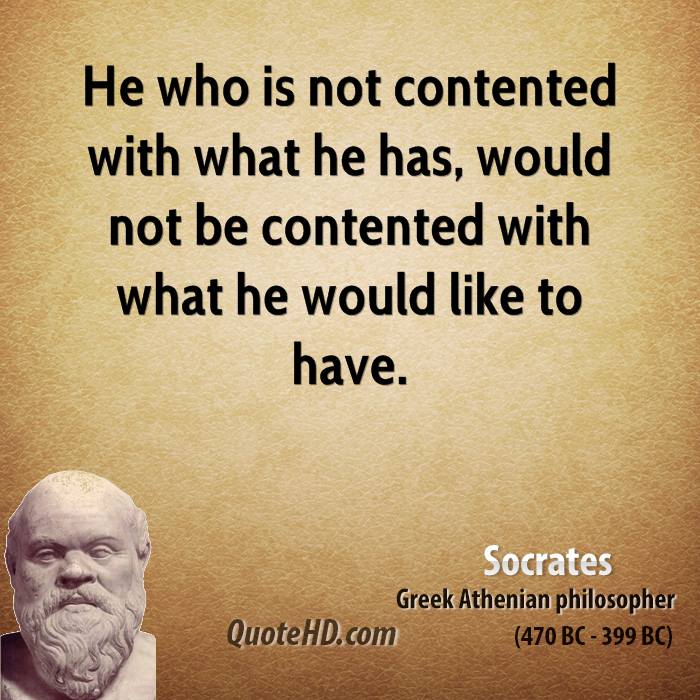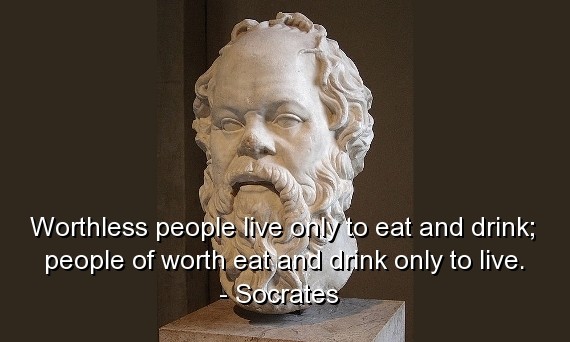
“Know you not that a good man does nothing for appearance sake, but for the sake of having done right?”
#TIMELESS QUOTES SOCRATES FREE#
“God has entrusted me with myself. No man is free who is not master of himself. A man should so live that his happiness shall depend as little as possible on external things. “Don't seek to have events happen as you wish, but wish them to happen as they do happen, and all will be well with you.” “He is a wise man who does not grieve for the things which he has not, but rejoices for those which he has. “Circumstances don't make the man, they only reveal him to himself.” “Any person capable of angering you becomes your master he can anger you only when you permit yourself to be disturbed by him.” “First say to yourself what you would be and then do what you have to do.” It is the action of an uninstructed person to reproach others for his own misfortunes of one entering upon instruction, to reproach himself and of one perfectly instructed, to reproach neither others or himself.” But the terror consists in our notion of death, that it is terrible. When, therefore, we are hindered, or disturbed, or grieved let us never impute it to others, but to ourselves that is, to our own views.

Thus death is nothing terrible, else it would have appeared so to Socrates. “Men are disturbed not by things, but by the views which they take of things. “There is only one way to happiness and that is to cease worrying about things which are beyond the power or our will.” “Don't explain your philosophy. Embody it.” “Wealth consists not in having great possessions, but in having few wants.” “If anyone tells you that a certain person speaks ill of you, do not make excuses about what is said of you but answer, "He was ignorant of my other faults, else he would not have mentioned these alone.” Through his teachings, Epictetus encourages us to recognize that while external events lie beyond our control, our thoughts, judgments, and responses remain firmly within our grasp. His philosophy, distilled in the Enchiridion and the Discourses, emphasizes the power of personal agency in the face of adversity. In doing so, we foster a mindset of mindfulness and intentionality, replacing impulsive reactions with deliberate responses that align with our values and principles.Įpictetus, born into slavery in the first century CE, rose above his humble origins to become a revered teacher and philosopher. In practice, Stoicism encourages us to engage in self-reflection, to examine our thoughts and beliefs critically, and to challenge the assumptions that underpin our emotional reactions. Finally, temperance teaches us the art of moderation, enabling us to strike a harmonious balance between desire and self-discipline.

Courage empowers us to face adversity with grace and resilience, while justice guides our interactions with others, fostering a sense of fairness and compassion. Through wisdom, we learn to discern the essential from the trivial, cultivating an understanding of life's true priorities.
#TIMELESS QUOTES SOCRATES FULL#
Stoicism teaches us to recognize that we cannot control the world around us, but we can control our reactions to it, thereby liberating ourselves from the shackles of circumstance and reclaiming our inner tranquility by taking full responsibility and accountability for it.īy embracing the Stoic principles of wisdom, courage, justice, and temperance, we can develop a robust moral compass that steers us toward virtuous living.

From the bustling streets of ancient Athens, Stoic philosophy emerged as a guiding light, illuminating a path toward inner peace, resilience, and purposeful living for those who practice the lessons and principles laid out by its founders.įounded by Zeno of Citium and rooted in the teachings of great thinkers like Epictetus, Seneca, and Marcus Aurelius, Stoicism offers a timeless framework for navigating the complexities of life, empowering us to develop mental fortitude and attain lasting happiness in the face of life's inevitable challenges.Īt the heart of Stoic philosophy lies the insight that our well-being is determined not by external events but by our own perceptions and responses to them.


 0 kommentar(er)
0 kommentar(er)
